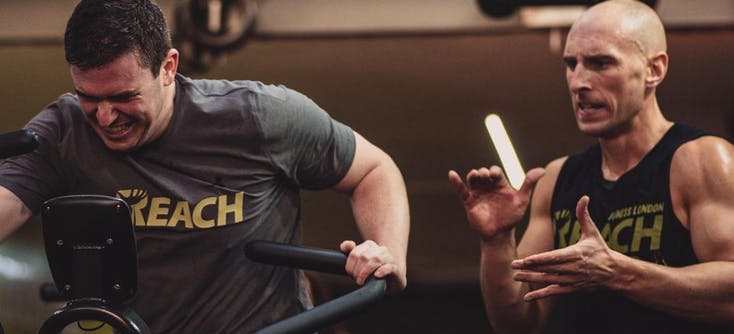When deciding between owning a fitness franchise or an independent gym studio, you choose between a proven business model and complete operational freedom. A fitness franchise has brand recognition, established business practices, and ongoing support.
Conversely, an independent studio provides the latitude to create your brand and set your own rules. Still, you must build everything from the ground up, including the client base and operational systems.
Fitness Franchise vs Independent Studio
Fitness Franchise
A fitness franchise operates under the umbrella of an established brand. The franchisee pays initial and ongoing fees for the rights to use the franchisor's business model, name, and support services. This model provides a quicker entry into the market due to brand recognition but involves less operational freedom.
Independent Studio
An independent gym studio is a self-started business not affiliated with any existing brand or franchise. The owner has full operational control, from the type of equipment to marketing strategies. While it offers more creative freedom, an independent studio may require more effort in marketing and establishing customer trust.
The Different Aspects of Each Business Type
Fitness franchises offer a proven business model, brand recognition, and support from the franchisor in areas such as marketing and training. This is particularly beneficial for those new to the fitness industry. However, franchisees must adhere to the rules and standards set by the franchisor, which can limit creativity and customization.
Independent studios offer greater freedom in business operations, allowing for personalized touches that reflect the owner's vision. This can be more fulfilling for those with specific ideas they wish to implement. However, independent owners bear full responsibility for all business aspects, from marketing to maintenance, without a franchise's support system.
What are the Costs Involved in Both Models?
The owner incurs various costs in fitness franchises and independent studio models, but the specifics can differ substantially. You'll pay an initial franchise fee, equipment costs, and ongoing royalties in a fitness franchise. These fees can be significant, especially for high-profile brands. Independent studios do not have franchise fees or royalties but may require substantial investment in marketing to build brand recognition. Both models require equipment investment, commercial space leasing, and operational expenses such as utilities and staff salaries.
Fitness Franchise:
- Initial Franchise Fee: Ranges from $20,000 to $50,000 and above
- Equipment Costs: Between $30,000 and $100,000
- Leasehold Improvements: $50,000 to $300,000
- Ongoing Royalties: Typically 5% to 10% of monthly gross revenue
- Monthly Utilities: $2,000 to $5,000
- Staff Salaries: $10,000 to $50,000 per month.
Independent Studio:
- Initial Setup Costs: Can range from $10,000 to $50,000 depending on location and size
- Equipment Costs: Similar to a franchise, between $30,000 and $100,000
- Lease or Rent: Varies widely but can be less expensive than franchise locations, $2,000 to $10,000 per month
- Monthly Utilities: $1,000 to $3,000
- Staff Salaries: $5,000 to $25,000 per month
- Marketing: $1,000 to $5,000 per month, as brand building is crucial.
How to Choose Between a Fitness Franchise and an Independent Studio

The decision between owning a fitness franchise and an independent studio hinges on several factors. Financial capacity is crucial; franchises often require a larger upfront investment but may offer quicker profitability due to established brand recognition. Skill set is another consideration.
Franchises provide a set business model and support, which can benefit those new to the industry. On the other hand, an independent gym allows for creative control and flexibility but may require more business acumen to operate successfully. Market research is essential to assess competition and consumer demand in your desired location.
Factors to Consider When Making a Decision
When deciding between a fitness franchise and an independent studio, consider initial and ongoing costs, the level of control you desire, and your skill set in business management and the fitness industry. A franchise usually has higher initial costs but offers brand recognition and ongoing support. An independent studio requires a strong understanding of business operations and marketing but offers more freedom. Your financial situation, business acumen, and personal preferences should guide your choice.
Evaluating Your Business Goals and Personal Preferences
Your personal goals and preferences are crucial in choosing between a fitness franchise and an independent studio. A franchise may suit you if you aim to capitalize on established brand recognition and benefit from a tried-and-true business model.
On the other hand, if you prefer having complete creative control and are willing to build your brand from the ground up, an independent studio could be the better option. Matching the business model with your long-term objectives and comfort level in daily operations is essential for success.
Can you Convert an Independent Studio into a Franchise?
Turning an independent studio into a franchise is possible but requires meticulous planning and a proven business model. You'll need to standardize your operations, marketing, and financial systems to make them replicable for franchisees.
Regulatory compliance and legal frameworks also come into play, requiring the creation of a Franchise Disclosure Document (FDD). Costs for this transformation can range from $50,000 to $200,000, including legal fees. This path allows you to expand your business reach, but it also entails relinquishing some control to ensure brand consistency across locations.
What are the Risks of Starting an Independent Studio?
Starting an independent fitness studio carries its own set of financial risks. With no backing from a franchise, you'll bear the full brunt of initial investment costs, ranging from $50,000 to $250,000, depending on the location and scale.
There's also the risk of market competition; unlike franchises that benefit from brand recognition, you'll need to build your brand from scratch. Initial marketing expenses can be substantial.
Failure rates are higher for independent studios, with approximately 20% failing in the first year, compared to 5% for franchises. Cash flow management is another concern, as you won't have the franchisor's support navigating financial challenges.
How Much Time Does it Take to Break Even in Both Models?
In a fitness franchise, the time to reach the break-even point can vary from 12 to 24 months, influenced by the initial investment, ongoing costs, and the rate at which you gain new memberships.
Franchises often have the advantage of brand recognition, which can accelerate the process.
For independent studios, the break-even point can be more variable, ranging from 18 to 36 months. This is due to the time required to build a client base and the need for brand recognition.
Financial planning and market research are crucial to gauge when you expect to start generating a profit.
Is a Franchise or an Independent Studio More Resilient to Market Changes?
Fitness franchises usually have the advantage of a robust support system, economies of scale, and an established customer base, making them more resilient to market fluctuations.
However, they may need more flexibility to adapt to local market conditions quickly. Independent studios have the agility to adjust more rapidly to market changes, but they need more financial cushion and brand recognition than franchises offer. Therefore, each has its own set of advantages and vulnerabilities regarding market resilience.










